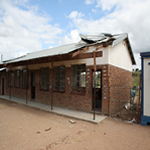 The Federal Government says it is aware of the challenges of climate change and was determined to address its effects on the nation.
The Federal Government says it is aware of the challenges of climate change and was determined to address its effects on the nation.
Nigeria’s Foreign Minister, Geoffrey Onyeama said this when he inaugurated the ecological fund intervention projects, executed at the Federal College of Education, Eha-Amufu in Isiuzo Local Government Area of Enugu State on Friday.
The projects include internal roads covering four kilometers, soil erosion and flood control.
“We have seen the counter effects of climate change and the challenges it poses to our people. How to support every community faced with this challenge is the priority of this government,” Onyeama said.
The minister said that the intervention was part of government’s quest to deliver its promises.
“The origin of these projects was an appeal made by the school authorities and the Federal Government has made an immediate response too.
“This is evident of the importance this administration attaches to development in our educational institutions,” he said.
The minister said that colleges of education were one of the most important pillars the current administration had to support in order to make the country great.
He said also that there was need to make life attractive for the teeming youths in the rural areas in order to stem rural-urban migration.
The Provost of the institution, Prof. Benjamin Mbah said that the projects were the first of such intervention since the start of academic activities in the institution in 1981.
He said that the actualisation of the projects had saved members of staff and students from the hazards of recurrent flooding that had wreaked havoc in the institution over the years.
“What we experienced then was walking unsteadily, sinking and falling on the clay and muddy road,” he said.
The provost, however, said that the execution of the projects was just the beginning of the jobs that needed to be done to salvage the institution.
READ: Universities tasked on alternative energy to solve power problem
Mbah said that the amount of flooding in the institution was phenomenal, adding that efforts needed to be made to put it to good use.
He said that the emphasis on the diversification of the economy would be boosted in the area if the aspect of the flood water was used for agricultural production, adding that Eha-Amufu was a major rice producing area.
“A very important aspect of the jobs that still needed to be done is the harnessing of the flood water that passes through this institution.
“If we can harvest the water for irrigation farming and artificial pond, we can grow fishes here and get our youths employed,’’ he said.
Mbah appealed to the government to execute the remaining projects in the school, adding that they had requested for the construction of a12km internal roads.
The project supervisor, Mr Gabriel Deage said that the projects were executed in accordance with international standard.
Deage said that though they encountered several challenges in the course of executing the jobs but the projects were guaranteed to last for 20 years.
He said that more than 14 culverts were constructed along with big drainage and application of asphalt on a 4km road.












 The Federal Government says it is aware of the challenges of climate change and was determined to address its effects on the nation.
The Federal Government says it is aware of the challenges of climate change and was determined to address its effects on the nation.



